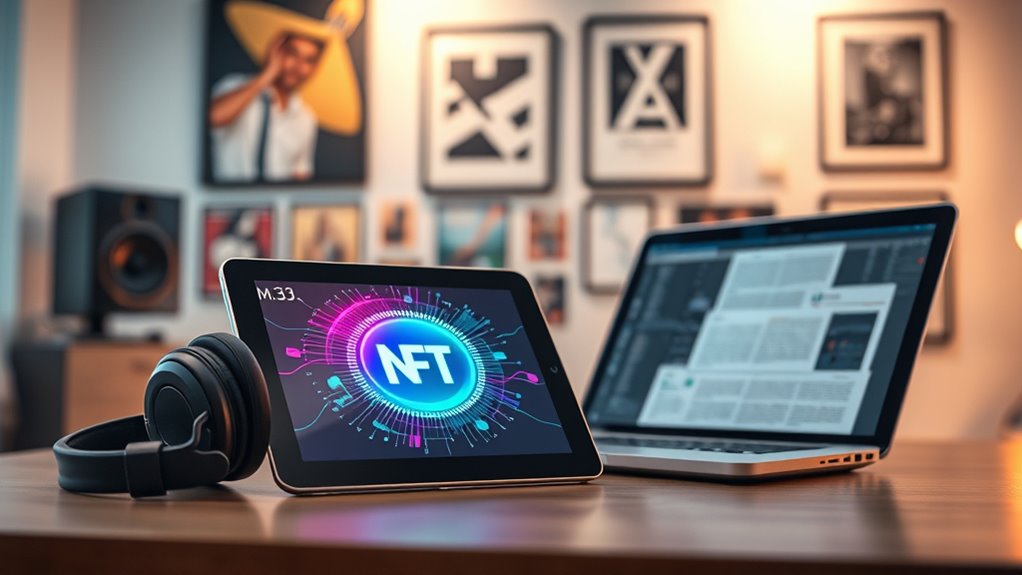When creating or selling NFTs as a musician, it’s vital to understand that owning an NFT doesn’t automatically transfer all your rights. You need clear licensing agreements that specify what the buyer can do—whether it’s displaying, reproducing, or commercializing your work. Protecting your rights ensures you maintain control and can monetize your music effectively. To fully grasp how to safeguard your creative assets in the NFT space, explore the necessary licensing options available.
Key Takeaways
- Owning an NFT does not automatically transfer copyright or licensing rights; clear agreements are essential.
- Licensing agreements specify what rights buyers receive, such as display, reproduction, or commercial use.
- Proper licensing helps protect the artist’s rights while allowing fans to enjoy the digital asset legally.
- Including detailed licensing terms in NFT sales prevents misunderstandings and legal disputes.
- Musicians should retain control over their rights and use clear licenses to monetize their work effectively.

As NFTs become an increasingly popular way for musicians to connect with fans and monetize their work, understanding rights and licensing is more important than ever. When you create or sell an NFT, you’re essentially offering a form of digital ownership that can include specific rights tied to your music or artwork. It’s imperative to recognize that owning an NFT doesn’t automatically mean you’ve transferred all rights to the buyer. Instead, it often involves licensing agreements that specify what the buyer can and cannot do with the digital asset. These agreements can range from simply owning a unique token to granting certain usage rights, such as streaming, sharing, or even creating derivative works. Clarifying these rights from the outset protects both you and your fans, ensuring expectations are clear and legal issues are minimized.
Understanding digital ownership in the context of NFTs is fundamental. When you mint an NFT, you’re creating a blockchain record that verifies your ownership of that specific digital item. However, this ownership doesn’t necessarily extend to copyrights or publishing rights unless explicitly stated in your licensing agreement. Many musicians mistakenly assume that NFT ownership equates to copyright transfer, but this isn’t the case unless you specifically include such terms. Instead, you can retain your rights while offering fans a token that signifies their ownership of a particular digital piece. This distinction is essential because it allows you to monetize your work while maintaining control over how it’s used and distributed.
Licensing agreements form the backbone of how rights are managed in the NFT space. These legal documents outline what rights you’re granting to the buyer and what rights you’re reserving. For example, you might sell an NFT that grants the owner the right to display your artwork online but not to reproduce or commercialize it. Alternatively, you could offer a license that allows certain commercial uses, like sampling your music in a project. The key is to be precise and transparent about what the buyer is purchasing. This clarity protects your intellectual property and prevents misunderstandings or misuse down the line.
Incorporating well-structured licensing agreements into your NFT transactions ensures that your rights are protected and your intentions are clear. It also gives you flexibility in how you monetize your music—whether through limited licenses, exclusive rights, or non-exclusive permissions. As you navigate the NFT landscape, always remember that digital ownership is just part of the equation. Clear licensing agreements are essential to safeguard your creative work and maintain control over how it’s used in this rapidly evolving space.
Frequently Asked Questions
Can I Sell NFT Rights Separately From the Music Itself?
Yes, you can sell NFT rights separately from the music itself. This allows you to define specific Digital Ownership and Licensing Flexibility, giving you control over how buyers use or resell the rights. By structuring your NFT sales this way, you can retain certain rights while granting others, making the process more versatile. Just guarantee your smart contracts clearly specify what rights are transferred to avoid any confusion.
Do NFT Licenses Cover Live Performances or Only Recordings?
NFT licenses typically cover recordings, not live performance rights, due to their scope. When you sell an NFT, it usually grants rights to the digital asset itself, like a song or video, but doesn’t include live performance rights unless explicitly stated. If you want to protect live performances, you’ll need separate agreements, as NFT scope generally doesn’t encompass the rights to perform publicly or record live shows.
How Do International Copyright Laws Affect NFT Licensing?
International copyright laws considerably impact NFT licensing because digital sovereignty and jurisdictional challenges create complications. You’ll find that licensing terms may vary depending on where buyers or sellers are located, making enforcement tricky. When you sell NFTs across borders, you need to understand how different jurisdictions interpret copyright, ensuring your rights are protected and avoiding legal issues. Managing these challenges requires careful planning to maintain clarity and control over your digital assets globally.
Can I Revoke NFT Licenses After They Are Sold?
Sure, you can revoke NFT licenses, but only if your smart contract allows it—otherwise, you’re stuck in a digital “I told you so” moment. Keep in mind, transfer restrictions mean once someone owns that NFT, revoking the license can be nearly impossible, making it a one-way street. So, if you’re thinking about pulling the plug, plan ahead—your digital rights might be more permanent than your inkjet tattoo.
What Happens if an NFT License Conflicts With Existing Contracts?
If an NFT license conflicts with existing contracts, you could face contract disputes or licensing conflicts, which may lead to legal complications. You need to clarify license terms beforehand and guarantee they don’t override or contradict your other agreements. If conflicts arise, consult with a legal expert to resolve issues quickly, preventing potential breaches or disputes that could jeopardize your rights or lead to costly legal battles.
Conclusion
Embracing NFT rights is like holding a key to a vast, uncharted kingdom where your music reigns freely. With each license you grant, you’re planting seeds in this digital landscape, shaping a future where your artistry blossoms beyond traditional boundaries. Remember, you hold the compass—navigating this new world means safeguarding your creative treasure and steering with confidence. Your music’s journey is yours to chart—step forward, and let your voice echo through every pixel and byte.









